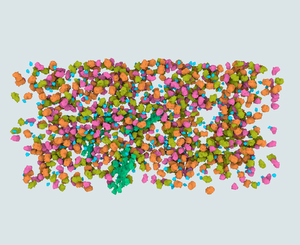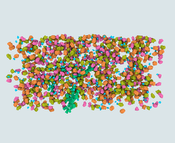Information
- Publication Type: Master Thesis
- Workgroup(s)/Project(s):
- Date: January 2017
- Date (Start): 1. October 2015
- Date (End): 8. February 2017
- TU Wien Library:
- First Supervisor: Ivan Viola
Abstract
Scientific illustrators communicate the cutting edge of research through their illustrations. There are numerous software tools that assist them with this job. Often they use professional modeling and animation 3D programs which are primarily used in games and movies industry. Because of that however these tools are not suitable for scientific illustration out of the box. There have been attempts to address this issue which brought tremendous results. This work focuses on visualization of structures and processes in biology, focusing mostly on the scales of nano- to micrometers. At this scale we often do not gain much by using hyper-realistic rendering style that the professional software aims for. Instead we want to employ more simplified style which helps to communicate the important story without losing much detail or scientific precision. The aim of this thesis is to push abilities of illustrators working on large scale molecular scenes. This is done by connecting two software packages—Maya and cellVIEW—combining the real-time rendering possibilities of cellVIEW and modeling and animation tools of Maya which results in more effective and efficient workflow.Additional Files and Images
Weblinks
No further information available.BibTeX
@mastersthesis{kouril-2015-maya2cellview,
title = "Maya2CellVIEW: 3D Package Integrated Tool for Creating Large
and Complex Molecular Scenes",
author = "David Kou\v{r}il",
year = "2017",
abstract = "Scientific illustrators communicate the cutting edge of
research through their illustrations. There are numerous
software tools that assist them with this job. Often they
use professional modeling and animation 3D programs which
are primarily used in games and movies industry. Because of
that however these tools are not suitable for scientific
illustration out of the box. There have been attempts to
address this issue which brought tremendous results. This
work focuses on visualization of structures and processes in
biology, focusing mostly on the scales of nano- to
micrometers. At this scale we often do not gain much by
using hyper-realistic rendering style that the professional
software aims for. Instead we want to employ more simplified
style which helps to communicate the important story without
losing much detail or scientific precision. The aim of this
thesis is to push abilities of illustrators working on large
scale molecular scenes. This is done by connecting two
software packages—Maya and cellVIEW—combining the
real-time rendering possibilities of cellVIEW and modeling
and animation tools of Maya which results in more effective
and efficient workflow.",
month = jan,
address = "Favoritenstrasse 9-11/E193-02, A-1040 Vienna, Austria",
school = "Institute of Computer Graphics and Algorithms, Vienna
University of Technology ",
URL = "https://www.cg.tuwien.ac.at/research/publications/2017/kouril-2015-maya2cellview/",
}



